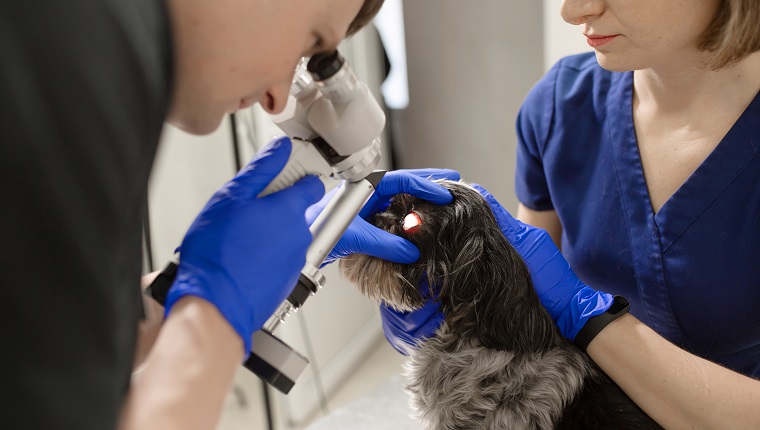Hyphema in dogs is a medical condition that results in blood making its way into the front chamber of the eye. The condition appears with a number of symptoms, including a general redness of the eye area and visible blood clots in the eye.
Blood in the front of the eye can also indicate a debilitating underlying condition.
If you see signs of blood in your dog’s eye or eyes, then you must consult your veterinarian for a proper diagnosis and course of treatment. Here’s what you should know about the symptoms, causes, and treatments of hyphema in dogs.
Symptoms Of Hyphema In Dogs
Hyphema in dogs can present several different symptoms. Some of the most common symptoms include:
- Visible blood within the eye
- The eye becoming red or cloudy
- Increased eye pressure
- Lesions on the cornea
- Persistent squinting or closing of the affected eye
Causes Of Hyphema In Dogs
There are a number of potential causes of hyphema in dogs. Some of the most common causes include:
- Trauma to the eye
- Parasitic infection
- Eye defects (including glaucoma)
- Retinal detachment
- High blood pressure
Additionally, blood in your dog’s eye can signify a serious underlying, life threatening condition, so it’s always important to consult with your vet if you see any of the previously mentioned symptoms in your dog.
Veterinary Treatments
If you suspect that your dog is developing hyphema, your veterinarian will want to carry out a full physical examination. They’ll send blood tests to a lab for analysis and may recommend X-rays and ultrasounds.
Your vet will also ask questions about your dog’s medical history and any other symptoms that might point to a secondary or underlying condition.
When it comes to treatment, it’s important to attempt to reduce any inflammation in the eye area and address any underlying causes of the condition. Vets may use various types of eye drops — including atropine and corticosteroid eye drops — as part of the treatment process.
In general, vets often advise that dogs undergoing treatment limit the amount of exercise they undertake. This is in case there are any blood clots present. Additionally, you may need to use an Elizabethan collar to avoid your dog irritating the affected eye area any further.
Has your dog ever suffered from hyphema? How did your vet help your canine recover? Tell us all about it in the comments below.









